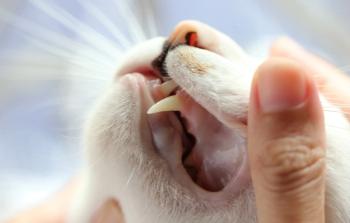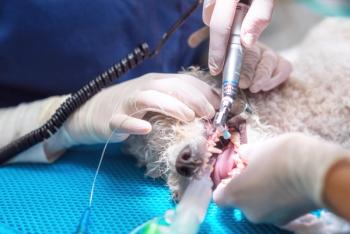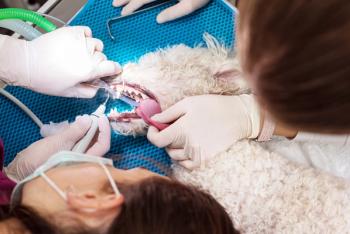
Marketing veterinary dentistry. It's not just business, it's personal
Elimination of pain is an effective focus and client motivator.
Dentistry is a tremendous area of potential practice growth and development for veterinarians. Periodontal disease has been proven to be the most prevalent of all veterinary diseases and historically, it has been inadequately addressed by many veterinarians because its significance is poorly understood. AAHA surveys have demonstrated very low compliance to dental recommendations.
Continuing dental education for the entire veterinary staff is fundamental to the development of an effective dental department. Continuing education in anesthesia for veterinary technicians and veterinarians will empower your team to confidently offer dental services.
Our positive thinking, perceptions and improved client compliance come from our knowledge and belief in dentistry. Improvements in attitudes and communication skills are fundamental to marketing veterinary dental services. Marketing veterinary dentistry is personal!
Knowledge is key
Clients don't necessarily care how much you know! However, what you do know will help you, your clients and their companions. I strongly recommend that you budget for training, take the time and enjoy it. You can learn the necessary skills to perform 90 percent of the services your patient's need very quickly. Purchase the necessary equipment (dental unit, dental X-ray and anesthesia monitors) and instruments to perform high-quality dental services. Your practice now has a valuable service to market.
I encourage you to develop a team approach to veterinary dental care. The best way I have found to develop a great team is to prove the value of your dental service by working on your team members' pets. They immediately realize the value of your dental services when their pets benefit. Empower each team member to understand the fundamentals of dental care. Motivate staff to provide home care (teeth brushing) for their own pets. Familiarize your team with efficacious dental hygiene products (
Continuing education is available at the Annual Veterinary Dental Forum (
Market compassion
Clients respond when they know how much you care. Clients expect you to tell them what their pets' need, and this is your opportunity to market dental services.
Positive attitudes influence and motivate clients. When they see your staff members "flipping lips" to look at their pet's teeth, they immediately understand that you care. Train staff members to identify traumatic occlusions, gingival inflammation, calculus, discolored and fractured teeth. Take photos of their pet's mouth. Photos confirm there is a need for your services.
Your team can compare their pets' oral photos to photos of normal healthy mouths. Explain that oral disease is often painful. Elimination of pain is an effective focus and client motivator. Sincere communication (listening and discussing) between veterinarians, staff and clients is among the most powerful marketing tools available. This simple and essential step of informing clients of the need for dental care generates tremendous demand for services. Remember, seeing your team caring for their companion generates believing clients. Hearing your recommendations to provide dental care improves client compliance. Explain the services needed; provide estimates that address potential or unexpected problems, and deliver optimal care.
To provide optimal dental care, schedule wisely. Never rush your client or yourself!
You will provide excellent service every time with careful planning. You need time to identify, treat and explain the services provided. Clients appreciate the value of services when they are adequately explained. This communication also improves home-care compliance. Daily teeth brushing results in clean healthy mouths. It also makes your services appear more effective and valuable.
Team-building strategies
Pick clients for your team. Involve them on dental treatments. It will motivate them to brush their pet's teeth daily!
Focus on pets of all ages and start with young patients. Working with young patients makes compliance with home care easier. Office protocols should ensure that your team demonstrates teeth brushing, recommends ideal toys and discourages offering pets hard objects to chew. Hard objects often result in fractured teeth.
When clients observe your staff members brushing their pet's teeth, they understand the importance of good home care and how to accomplish it. This is not just a Pet Dental Health Month activity; it's a lifelong commitment. By demonstrating teeth brushing techniques, clients learn quickly that your team is dedicated to help. Consider offering weekly teeth brushing of client's pets' as an important dental service. This will reinforce your dedication to dental care and will be regarded highly by clients.
Building the business
Marketing dental care throughout the year is an excellent business strategy.
A personal approach makes your marketing efforts more effective. Here are 12 tips to expanding your recognition.
1) Create client awareness of the need for preventive dentistry.
Is your team aware of the signs of dental disease, and do they flip lips to show clients they truly care? Make sure they point out healthy as well as unhealthy oral conditions. Everyone needs to hear something good.
2. When you and your staff members discuss dental services with clients, your marketing becomes personal and very effective.
Does your team communicate with excitement, knowledge and through action? Clients listen when your employees explain the dental care they provide for their own pets. A positive attitude results in improved client compliance to your dental care recommendations.
3. All patients need dental care, but focus on younger patients.
Establish an exam-room protocol to talk about dental needs for all patients including kittens and puppies. Explain the normal sequence of deciduous tooth exfoliation and adult eruption. Suggest ways to avoid problems.
4. Target clients who already understand the importance of dental services.
Early preventive dental care is better medicine. Why wait to offer services when the majority of patients need care today? Periodontal disease is infectious, inflammatory and often progressive. Gingivitis is reversible, periodontal disease is not. Explain the stages of periodontal disease, prevention and treatments.
5. Use visual aids to identify the need for dental services.
Take photos of pet's teeth. Compare these photos to normal healthy mouth photos to demonstrate the need for dental services. Compare photos taken before and after teeth cleaning to show the value of dental services.
Some companies provide client brochures, exam-room posters demonstrating the stages of periodontal disease in dogs and cats, and dental models, which are excellent for educating clients and improving compliance to your recommendations.
6. Emphasize professional care tailored to the patient needs.
It's no longer just a "dental". You provide teeth cleaning, periodontal health assessment and dental treatment. Smaller patients and those not receiving home care require more frequent professional care.
7. Provide estimates that market the value of your services.
Estimates communicate the potential variation of patient needs and treatments provided. Your estimates must explain the quality of anesthesia, patient monitoring and dental services you are providing. The estimate emphasizes how much you care.
8. Communicate with clients during dental procedures to engage them in treatment decisions. They want to be on your team.
Cell phones and pagers are effective tools to help communicate with clients during dental procedures. Clients appreciate this personal approach to dental care.
9. Emphasize the necessity for home care (daily teeth brushing).
Pets' teeth and your services will both look bad if daily teeth brushing are not provided. Offer diets and other products that help in the control of plaque and calculus (
10. Emphasize follow-up evaluation to determine the efficacy of home care.
Consider offering all clients a two-week re-evaluation. This allows for evaluation of patient healing as well as client home-care compliance. This re-evaluation shows your client you personally care for his or her pet.
11. Remind and reinforce the need for continued dental care.
Newsletters, E-mail, newsletters, postcard and telephone reminders have all been effective marketing tools to encourage client compliance to your dental care recommendations.
12. Market your services to generate new clients.
Telephone books, Web sites, e-mail and use of various forms of media (newspaper, radio and television) are all potential opportunities to educate clients about the availability of dental care. Feature articles on dental care can be as effective as advertising for getting your message out to potential clients.
On the technical side, it's important to develop the dental and anesthesia skills to provide optimal patient care. With appropriate equipment, instrumentation and training, you have a valuable dental service to market. Your dental team will help you deliver an effective marketing program when they understand the need for dental care, the value of your services and established protocols for communication with clients. Your positive thinking creates positive perceptions, beliefs and attitudes for your entire team. Remember: It's not just business, it is personal!
Dr. Kressin, a diplomate of the American Veterinary Dental College, operates a specialty dental and oral surgery service in Oshkosh and Milwaukee, Wis. He is a fellow of the Academy of Veterinary Dentistry.
Newsletter
From exam room tips to practice management insights, get trusted veterinary news delivered straight to your inbox—subscribe to dvm360.





